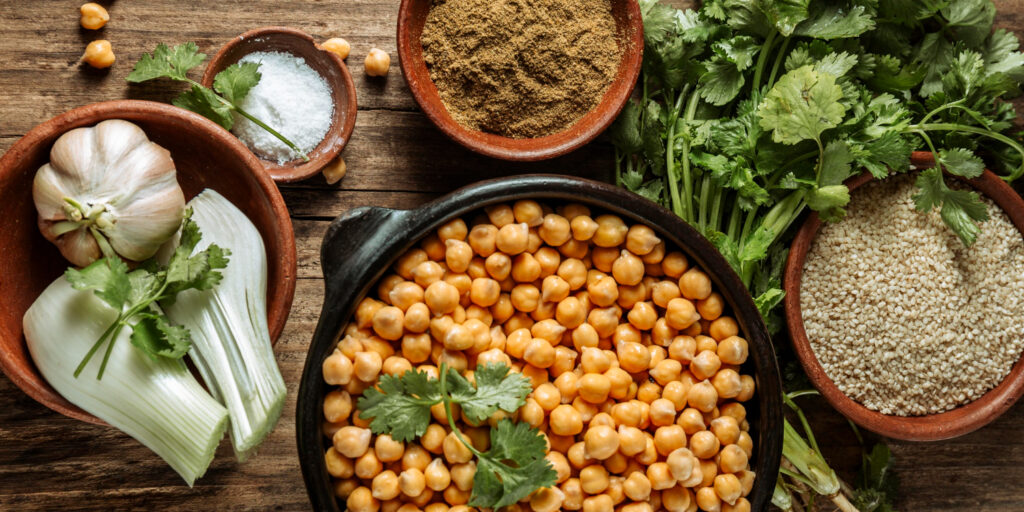
Chickpeas, also known as garbanzo beans, are a nutritious member of the pulse family. Pulses, which include beans, lentils, and dry peas, are the dried edible seeds of legume plants. Chickpeas are renowned for their high fiber, protein, and healthy fat contents, making them a staple in many diets worldwide
Nutritional Profile of Chickpeas
Chickpeas are nutrient-dense, providing essential vitamins, minerals, and antioxidants. A one-cup serving of cooked chickpeas offers:
- Calories: 269
- Fat: 4.25 grams (g)
- Sodium: 399 milligrams (mg)
- Carbohydrates: 44.9 g
- Fiber: 12.5 g
- Added sugars: 7.87 g
- Protein: 14.5 g
This serving size also supplies significant amounts of manganese, folate, iron, magnesium, potassium, and zinc. These nutrients are vital for energy production, immune support, and maintaining healthy bodily functions.
Health Benefits
Blood Sugar Management
Chickpeas have a low glycemic index (GI), meaning they release glucose slowly into the bloodstream, which helps in managing blood sugar levels. This property is particularly beneficial for people with diabetes or those at risk of developing type 2 diabetes. Chickpeas help reduce insulin resistance, lowering the risk of high blood sugar and related complications.
Cardiovascular Health
Chickpeas can reduce the risk of cardiovascular disease (CVD), which includes conditions like coronary artery disease, stroke, and heart failure. They help control cholesterol, triglycerides, and blood pressure, which are significant risk factors for CVD. Additionally, chickpeas contain healthy fats and bioactive compounds with anti-inflammatory and antioxidant properties that support heart health.
Weight Management

Due to their high fiber and protein content, chickpeas can aid in weight management. Fiber adds bulk to meals, promoting a feeling of fullness and reducing overall calorie intake. The slow digestion of chickpeas also helps in controlling hunger, which can be beneficial for weight loss and preventing obesity-related health issues.
Gut Health
Chickpeas support gut health by promoting regular bowel movements and alleviating constipation. They help maintain a balance of good and bad microorganisms in the gut microbiome, which can alleviate symptoms of inflammatory bowel disease (IBD) like diarrhea, constipation, and stomach pain.
Environmental Benefits
Chickpeas are environmentally friendly, requiring less water than other protein sources and enriching the soil they grow in, reducing the need for chemical fertilizers. This makes them a sustainable and affordable food choice.
Risks and Considerations
Chickpeas are naturally gluten-free and generally not allergenic. However, increasing fiber intake too quickly can cause gas and bloating. To minimize this, gradually add chickpeas to your diet and soak dry chickpeas overnight to reduce gas-triggering compounds. Rinsing canned chickpeas can also help reduce bloating.
Tips for Incorporating Chickpeas
Chickpeas are versatile and can be used in various dishes:
- Breakfast: Blend chickpeas into smoothies or mash them for vegetable or herb scrambles.
- Lunch: Add oven-roasted chickpeas to salads or enjoy them as a snack.
- Dinner: Use chickpeas in soups, stews, curries, casseroles, tacos, and more.
- Desserts: Create chickpea-based cookies, brownies, truffles, and dessert hummus.
Additionally, aquafaba, the liquid from canned chickpeas or cooking water from dried chickpeas, can be used as a vegan substitute for eggs and dairy in recipes like meringues and vegan ice cream
Chickpeas are a powerhouse of nutrition, offering numerous health benefits and being environmentally friendly. Their versatility makes them an excellent addition to any diet, helping manage blood sugar, support heart and gut health, and aid in weight management. Incorporating chickpeas into your meals can contribute to a healthier and more sustainable lifestyle











